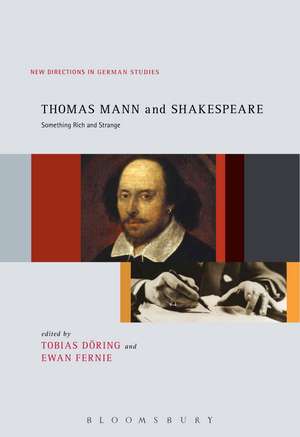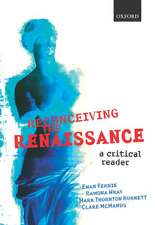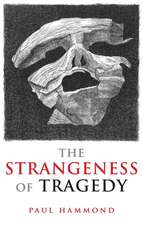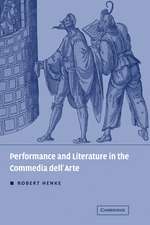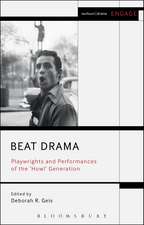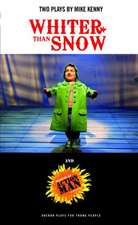Thomas Mann and Shakespeare: Something Rich and Strange: New Directions in German Studies
Editat de Tobias Döring, Ewan Fernieen Limba Engleză Paperback – 23 aug 2017
Din seria New Directions in German Studies
- 14%
 Preț: 183.70 lei
Preț: 183.70 lei -
 Preț: 470.91 lei
Preț: 470.91 lei - 8%
 Preț: 145.46 lei
Preț: 145.46 lei - 11%
 Preț: 219.84 lei
Preț: 219.84 lei - 23%
 Preț: 190.50 lei
Preț: 190.50 lei -
 Preț: 169.04 lei
Preț: 169.04 lei -
 Preț: 217.09 lei
Preț: 217.09 lei - 7%
 Preț: 134.49 lei
Preț: 134.49 lei - 14%
 Preț: 183.24 lei
Preț: 183.24 lei -
 Preț: 217.62 lei
Preț: 217.62 lei - 21%
 Preț: 214.78 lei
Preț: 214.78 lei - 30%
 Preț: 718.85 lei
Preț: 718.85 lei - 22%
 Preț: 237.93 lei
Preț: 237.93 lei - 22%
 Preț: 225.77 lei
Preț: 225.77 lei - 22%
 Preț: 225.41 lei
Preț: 225.41 lei - 23%
 Preț: 222.46 lei
Preț: 222.46 lei - 30%
 Preț: 714.12 lei
Preț: 714.12 lei - 30%
 Preț: 568.22 lei
Preț: 568.22 lei - 21%
 Preț: 218.36 lei
Preț: 218.36 lei - 11%
 Preț: 218.47 lei
Preț: 218.47 lei - 13%
 Preț: 186.35 lei
Preț: 186.35 lei - 30%
 Preț: 569.94 lei
Preț: 569.94 lei - 21%
 Preț: 218.83 lei
Preț: 218.83 lei - 22%
 Preț: 256.20 lei
Preț: 256.20 lei - 14%
 Preț: 190.06 lei
Preț: 190.06 lei - 23%
 Preț: 197.14 lei
Preț: 197.14 lei - 13%
 Preț: 255.11 lei
Preț: 255.11 lei - 22%
 Preț: 226.79 lei
Preț: 226.79 lei - 30%
 Preț: 568.14 lei
Preț: 568.14 lei - 14%
 Preț: 191.85 lei
Preț: 191.85 lei -
 Preț: 183.24 lei
Preț: 183.24 lei -
 Preț: 231.81 lei
Preț: 231.81 lei - 22%
 Preț: 230.24 lei
Preț: 230.24 lei
Preț: 256.77 lei
Preț vechi: 330.81 lei
-22% Nou
Puncte Express: 385
Preț estimativ în valută:
49.15€ • 53.40$ • 41.31£
49.15€ • 53.40$ • 41.31£
Carte tipărită la comandă
Livrare economică 21 aprilie-05 mai
Preluare comenzi: 021 569.72.76
Specificații
ISBN-13: 9781501336089
ISBN-10: 1501336088
Pagini: 280
Ilustrații: 4 b/w illustrations
Dimensiuni: 215 x 139 x 22 mm
Greutate: 0.33 kg
Ediția:NIPPOD
Editura: Bloomsbury Publishing
Colecția Bloomsbury Academic
Seria New Directions in German Studies
Locul publicării:New York, United States
ISBN-10: 1501336088
Pagini: 280
Ilustrații: 4 b/w illustrations
Dimensiuni: 215 x 139 x 22 mm
Greutate: 0.33 kg
Ediția:NIPPOD
Editura: Bloomsbury Publishing
Colecția Bloomsbury Academic
Seria New Directions in German Studies
Locul publicării:New York, United States
Caracteristici
Demonstrates the scope for new ways of reading in literary studies in general, renewing European intellectual connections in the wake of post-colonialism and globalization
Notă biografică
Tobias Döring is Chair of English Literature, LMU München, Germany, and past President of the German Shakespeare Society. His latest books are (ed. with Virginia Mason Vaughan) Critical and Cultural Transformations: Shakespeare's The Tempest - 1611 to the Present and (ed. with Mark Stein) Edward Said's Translocations: Essays in Secular Criticism. Ewan Fernie is Chair, Professor and Fellow at the Shakespeare Institute, University of Birmingham, UK. His latest book, The Demonic: Literature and Experience, gives considerable attention to Shakespeare and Mann.
Cuprins
Acknowledgements Notes on Contributors Introduction: Something Rich and Strange (with A Note onMann's Shakespeare, by Tobias Döring, LMU München, Germany) Ewan Fernie (University of Birmingham, UK)1 The Violence of Desire: Shakespeare, Nietzsche, Mann Jonathan Dollimore (University of York, UK)2 Laughter in the Throat of Death: Thomas Mann'sShakespearean Sprachkrise Richard Wilson (University of Kingston, UK)3 Masquerades of Love: Love's Labours's Lost and the MusicalDevelopment of Shakespeare's Comedy in Mann's DoktorFaustus Alexander Honold (Universität Basel, Switzerland)4 The Magic Fountain: Shakespeare, Mann and ModernAuthorship Tobias Döring (LMU München, Germany)5 'A dark exception among the rule-abiding': Thomas Mannand Othello Friedhelm Marx (Universität Bamberg, Germany)6 'Who chooseth me must give and hazard all he hath':Shakespearean Overtones in Mann's Der Tod in Venedig John T. Hamilton (Harvard University, USA)7 Shakespeare to Mann, via Wagner Dave Paxton (University of Birmingham, UK)8 'Yes-yes, no': Mann, Shakespeare, and the Struggle forAffirmation Ewan Fernie (University of Birmingham, UK)9 Teenage Fanclub: Mann and Shakespeare in the QueerPantheon Heather Love (University of Pennsylvania, USA)10 A Kind of Loving: Hans Castorp as Model Critic 207David Fuller (University of Durham, UK)11 Changing the Subject Ulrike Draesner (writer and translator, Berlin, Germany)Afterword Elisabeth Bronfen (Universität Zürich, Switzerland)
Recenzii
When Thomas Mann speaks of 'the most tremendous case of poetic genius the world has ever seen', he is referring not to Homer, nor to Goethe - but to Shakespeare. It is strange that this important identification has been so little heeded or seriously examined for so long. At last the present book makes up for such neglect, opening our eyes to the truly 'tremendous case' of one of the great dialogues of world literature.[Wenn Thomas Mann über den 'den ungeheuersten Fall von Dichtertum' spricht, 'den die Erde sah', dann spricht er weder von Homer noch von Goethe, sondern von Shakespeare. Es ist eigenartig, wie lange dieses Diktum kaum gehört und wie selten es ernst genommen wurde. Dass das Versäumte mit diesem Buch endlich nachgeholt wird, öffnet den Blick auf den wahrhaft 'ungeheuren Fall' eines Dialogs von weltliterarischem Ausmaß.]
Literature is never harmless. Thomas Mann and William Shakespeare reflect on the abysses that form part of Western history as well as their political and aesthetic implications. This unique collection of essays, the first of its kind, renders the works of both authors transparent to one another and offers a fresh angle from which to look at literary modernity. This volume makes for inspiring re-reading of both Shakespeare and Mann. [Literatur ist niemals harmlos. Thomas Mann und William Shakespeare reflektieren die Abgründe der abendländischen Geschichte, deren politische und ästhetische Implikationen. Diese Sammlung von Aufsätzen, die erste ihrer Art, macht die Werke beider Autoren füreinander transparent und bietet eine neue Sicht auf die literarische Moderne. Dieser Band inspiriert zur Relektüre von Shakespeare und Mann.]
The modern appreciation of Shakespeare is in great part the legacy of the profound scholarship, criticism, and artistic imagination of Germany. This adventurous, wide-ranging, and highly experimental volume asks how the most complex and dialectical of German novelists apprehended Shakespeare-and, in turn, how our vision of Shakespeare might be made larger and more subtle by reading him side-by-side with Mann. What keeps coming into view in this intriguing book is how the kinship of these two authors lies in a bold commitment to irony and the ambivalent: sexual, aesthetic, moral, political, and philosophic.
The work of 12 noted scholars from the UK, the US, and Germany, these essays analyze the literary/philosophical affinities of Shakespeare and Mann. Like his contemporaries, Mann knew Shakespeare well. The first German translations of Shakespeare's plays appeared in the late 18th century, and these were followed by the excellent Schlegel-Tieck renderings; scholarly studies of Shakespeare helped to establish his reputation, and Shakespeare's plays were staged more frequently than those of Goethe or Schiller. Mann, as his diary reveals, drank in Shakespeare from his early youth. In Mann's novel Dr. Faustus the comedy Love's Labors Lost serves as Leverkühn's basis for a decidedly uncomic opera (on Leverkühn's desk lie the sonnets and editions of Twelfth Night, Much Ado about Nothing, and Two Gentlemen of Verona), and there are many traces of Othello in Mann's work. Shakespeare is in Tonio Kröger, Der Tod in Venedig, Der Zauberberg, and numerous critical essays. Aside from philological evidence, some essays argue, in a more theoretical manner, that Mann and Shakespeare had striking similarities in outlook: e.g., Jonathan Dollimore claims that the two men are most intimately linked by their deep pessimism, their underlying fear that knowledge is illusory, that, as in Hamlet, it can kill action. Summing Up: Recommended. Graduate students, researchers, faculty.
The volume offers just what the authors wanted: an unconventional, sometimes provocative, often highly original series of insights into Shakespeare and Thomas Mann.
[A] very fine collection of essays.
Literature is never harmless. Thomas Mann and William Shakespeare reflect on the abysses that form part of Western history as well as their political and aesthetic implications. This unique collection of essays, the first of its kind, renders the works of both authors transparent to one another and offers a fresh angle from which to look at literary modernity. This volume makes for inspiring re-reading of both Shakespeare and Mann. [Literatur ist niemals harmlos. Thomas Mann und William Shakespeare reflektieren die Abgründe der abendländischen Geschichte, deren politische und ästhetische Implikationen. Diese Sammlung von Aufsätzen, die erste ihrer Art, macht die Werke beider Autoren füreinander transparent und bietet eine neue Sicht auf die literarische Moderne. Dieser Band inspiriert zur Relektüre von Shakespeare und Mann.]
The modern appreciation of Shakespeare is in great part the legacy of the profound scholarship, criticism, and artistic imagination of Germany. This adventurous, wide-ranging, and highly experimental volume asks how the most complex and dialectical of German novelists apprehended Shakespeare-and, in turn, how our vision of Shakespeare might be made larger and more subtle by reading him side-by-side with Mann. What keeps coming into view in this intriguing book is how the kinship of these two authors lies in a bold commitment to irony and the ambivalent: sexual, aesthetic, moral, political, and philosophic.
The work of 12 noted scholars from the UK, the US, and Germany, these essays analyze the literary/philosophical affinities of Shakespeare and Mann. Like his contemporaries, Mann knew Shakespeare well. The first German translations of Shakespeare's plays appeared in the late 18th century, and these were followed by the excellent Schlegel-Tieck renderings; scholarly studies of Shakespeare helped to establish his reputation, and Shakespeare's plays were staged more frequently than those of Goethe or Schiller. Mann, as his diary reveals, drank in Shakespeare from his early youth. In Mann's novel Dr. Faustus the comedy Love's Labors Lost serves as Leverkühn's basis for a decidedly uncomic opera (on Leverkühn's desk lie the sonnets and editions of Twelfth Night, Much Ado about Nothing, and Two Gentlemen of Verona), and there are many traces of Othello in Mann's work. Shakespeare is in Tonio Kröger, Der Tod in Venedig, Der Zauberberg, and numerous critical essays. Aside from philological evidence, some essays argue, in a more theoretical manner, that Mann and Shakespeare had striking similarities in outlook: e.g., Jonathan Dollimore claims that the two men are most intimately linked by their deep pessimism, their underlying fear that knowledge is illusory, that, as in Hamlet, it can kill action. Summing Up: Recommended. Graduate students, researchers, faculty.
The volume offers just what the authors wanted: an unconventional, sometimes provocative, often highly original series of insights into Shakespeare and Thomas Mann.
[A] very fine collection of essays.
